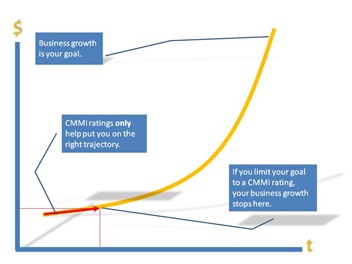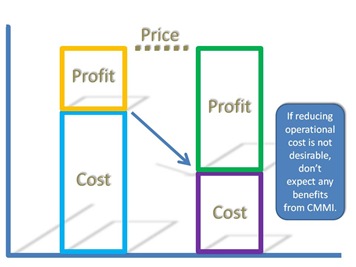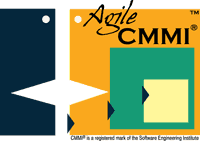Too many people don’t *get* that working on your processes without connecting your processes to cash flow (or however you prefer to refer to value-generation) is totally missing the point of working on them in the first place.
Even in the public and non-profit sectors, there is something going on involving value-generation and the pursuit of continually maximizing value-add, value to society, value to benefactors, value to beneficiaries is why you work towards performance excellence. That’s why we bother to improve processes.
Otherwise….
From Andrew Brettle’s experience at an agile conference in London.
I would temper his comments only ever so slightly to point out that there are still too many organizations who have not progressed in their sw-dev thinking in 30 years. So, while many mature organizations have moved on from standard, linear, unidirectional development, far too many have not.
On the other hand, I’ve seen equally too many “agile” presentations erecting straw men effigies of “traditional” development to burn, often characterizing them as the embodiment of all-things-not-agile-born. That, too, has to stop.
If you use CMMI for the ratings only you will be limiting your growth. CMMI can only put you on a trajectory for growth but can’t determine what that trajectory should be. For that, executives must identify business goals they want to aspire to and then you can use CMMI to help achieve them. In particular, goals in terms of time to market, cycle time, product or service quality, efficiency, customer delight, response time… anything that equates with operational excellence and profit. Without these business goals and the measures to determine how well you’re moving towards them, CMMI will just frustrate your people and waste your money.
If you don’t value the idea of raising profits by lowering operational cost, then don’t bother with CMMI. If all you want is a rating, then you will never see any benefits from CMMI. Either you establish business growth goals, or CMMI will just eat away at your business. If getting leaner isn’t appealing, stay away from CMMI.
If getting leaner isn’t appealing, stay away from CMMI.
It makes me sick every time I hear a company complain how much it costs to maintain their CMMI “rating”. It pains me to hear of companies with recent ratings who are still habitually over budget and behind schedule, and not getting better. I’m bewildered by companies afraid to make changes to the operations for fear of “losing” their ratings. What these real-life I’m-not-making-this-up scenarios all have in common is that every one of these situations shares the attribute of using CMMI for the ratings and not the business value of growth.
I’ll take some blame for that on behalf of the other hundreds of consultants and appraisers out there. Sure, I can’t prevent executives from being short-sighted and ADHD, but I can do my part for allowing executives to go forth with misuse of CMMI knowing that they will ultimately fail to see any benefits. Is that how I personally work? Of course not, but that is how too many other consultants and appraisers work, so on their behalf, I’ll fall on the sword. Shame on us for allowing companies to use CMMI in stupid ways when we know it’s a bad idea.
 On the other hand, what can we consultants and appraisers do when executives willingly take the “ratings over growth” route? When executives are not willing to stand up for what’s best for the business? When the executives are not motivated to pursue operational excellence? At the same time, we’ve all been using the wrong language with CMMI. Who the heck wants to hear about “process improvement”?!? That’s a lot like wanting to hear “you need to go on a diet and get more exercise”. Who wants that?
On the other hand, what can we consultants and appraisers do when executives willingly take the “ratings over growth” route? When executives are not willing to stand up for what’s best for the business? When the executives are not motivated to pursue operational excellence? At the same time, we’ve all been using the wrong language with CMMI. Who the heck wants to hear about “process improvement”?!? That’s a lot like wanting to hear “you need to go on a diet and get more exercise”. Who wants that?
What executives need to hear and see is that CMMI for the ratings limits growth and is worthless but CMMI in support of increasing profits is priceless.
Use CMMI for a rating only and your business will stop its growth right where the rating starts.


 If getting leaner isn’t appealing, stay away from CMMI.
If getting leaner isn’t appealing, stay away from CMMI. On the other hand, what can we consultants and appraisers do when executives willingly take the “ratings over growth” route? When executives are not willing to stand up for what’s best for the business? When the executives are not motivated to pursue operational excellence? At the same time, we’ve all been using the wrong language with CMMI. Who the heck wants to hear about “process improvement”?!? That’s a lot like wanting to hear “you need to go on a diet and get more exercise”. Who wants that?
On the other hand, what can we consultants and appraisers do when executives willingly take the “ratings over growth” route? When executives are not willing to stand up for what’s best for the business? When the executives are not motivated to pursue operational excellence? At the same time, we’ve all been using the wrong language with CMMI. Who the heck wants to hear about “process improvement”?!? That’s a lot like wanting to hear “you need to go on a diet and get more exercise”. Who wants that?

